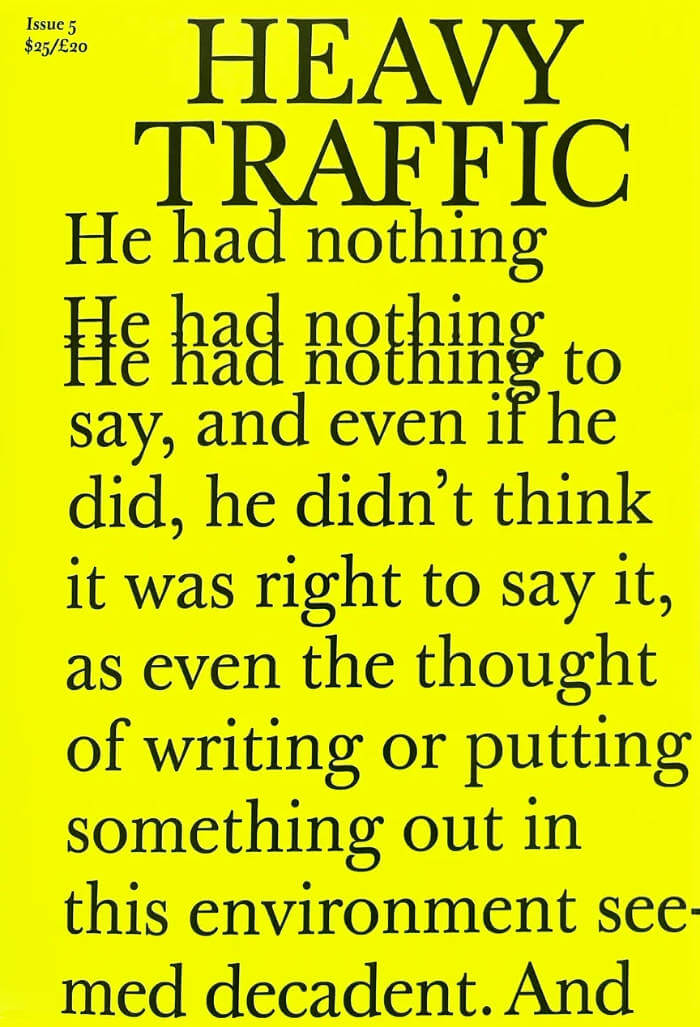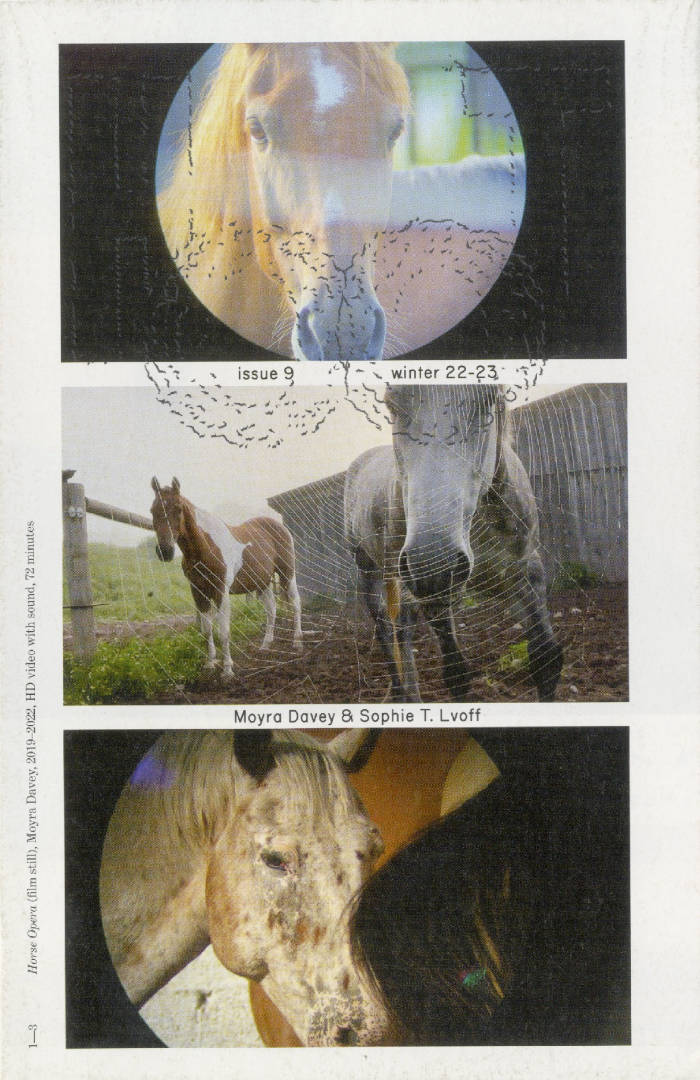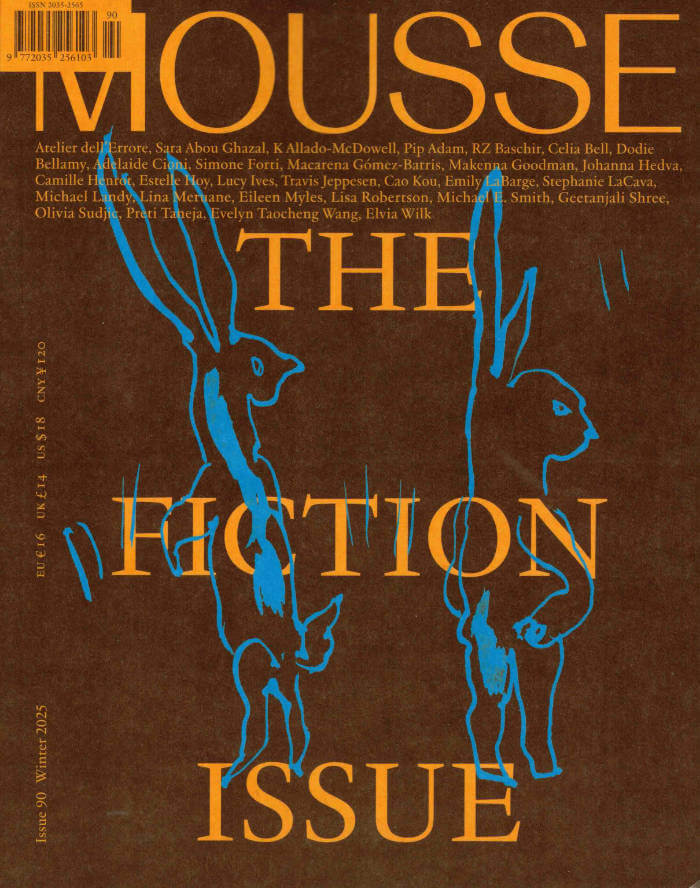
Heavy Traffic V
Patrick McGraw ed.
Featuring new fiction from Mark Leckey, Reinier de Graaf, Amalia Ulman, Lynne Tillman, Bud Smith, Hannah Regel, Ada Antoinette, Mark von Schlegell, Claude Balls, Riska Seval, & Sarah Thomas.
Language: English

Patrick McGraw ed.
Featuring new fiction from Mark Leckey, Reinier de Graaf, Amalia Ulman, Lynne Tillman, Bud Smith, Hannah Regel, Ada Antoinette, Mark von Schlegell, Claude Balls, Riska Seval, & Sarah Thomas.
Language: English

A re-examination of Yvonne Rainer's Parts of Some Sextets, a radical performance and pivotal piece in the American choreographer's career, which led her to theorize her conception of dance in the 1960s, before being revived in 2019.
Parts of Some Sextets, Yvonne Rainer's 1965 performance for ten people and twelve mattresses, represents a turning point in the American choreographer's oeuvre. "My mattress monster," as Rainer calls it, was built in her formative years with the experimental downtown New York group Judson Dance Theater. In this work, she asserted her exploration of "ordinary" actions as well as her disregard for narrative constructions to create an intricate choreography that unfolded with a new scene every thirty seconds.
More than half a century after its premiere, Rainer, in collaboration with choreographer and dancer Emily Coates, directed the 2019 revival of the piece for the Performa 19 Biennial in New York, grappling with the changing contexts of a new presentation of her radical performance. Remembering a Dance: Parts of Some Sextets, 1965/2019 delves into every aspect of this dance, from its original manifestation to its reconstitution.
This book, designed by visual artist Nick Mauss, includes previously unpublished archival images and documents from the 1965 stagings at the Judson Memorial Church in New York and the Wadsworth Atheneum in Hartford, Connecticut. Texts by Emily Coates, RoseLee Goldberg, Jill Johnston, Kathy Noble, Yvonne Rainer, David Thomson, Lynne Tillman, and Soyoung Yoon, as well as a new interview with Rainer, pose questions about the trajectories of artworks, performers, and audiences, all while tracing the life—and afterlife—of a dance.
Edited by Emily Coates.
Texts and contributions by Emily Coates, RoseLee Goldberg, Jill Johnston, Kathy Noble, Yvonne Rainer, David Thomson, Lynne Tillman and Soyoung Yoon; conversation between Yvonne Rainer, Emily Coates and Nick Mauss.

Oracles don’t require belief—they now theatrically suspend disbelief. No longer advisors of world policy, they run Locus Solus, a town that has come to ramble around an eponymous theatre and chocolate factories. Theo, a centuries-old vampire intent on remaining contemporary through performance, visits Locus Solus, which is hosting Praise Estate, an international theatre festival. He uses the festival as an opportunity to stay with Gean, his oracle boyfriend, who is there visiting family. Theo has a fetish for the future, fixated on the one thing he is in no shortage of.
Confidences / Oracle is a lover’s trip to a weeklong theatre festival. A vehicle for recontextualising recent performance scripts and texts, Oracle is the third instalment in Ivan Cheng’s Confidences series, which intertwines vampires and performance as sites for circulation and recognition.

The 9th HOOT pops up for the winter 2022-23, but the conception of this issue started well over a year ago at our beloved Plage Avant (Traduttore, traditore’s studio, Marseille).
We met Sophie T. Lvoff at many openings and art related events in Marseille these last few years, having a practice that appears mainly as photography, Gufo got curious about all the processes that she uses which involve sound, installation, writing… and more. She welcomed us in her studio of the city of Marseille where she recently settled.
We found out about the “trompe-l’œil” of this iconic checkered table, witnessed the installations of translucid and colored objects evolving on the sunny wall, and looked through her photographic chamber it’s called a large-format camera, but this is funny… For this issue, Sophie suggested to interview another artist, Moyra Davey, who also works in photography and writing, and appeared to have shared experiences too.
The topics of everyday life, intimacy that images embody in both their works, take another dimension as soon as their thoughts, voices and writing expand and express the entirety of their gestures.
This issue is the first interview between two native English-speaking artists, who have ties to the French language from childhood.
The penpals are the main characters of that encounter where we are very welcome to join in their very generous conversations. This is only an excerpt of a long and well referenced correspondence.

Mousse celebrates its 90th issue with a collectible edition, with a special design and format, entirely focused on fiction.
Bringing together a cohort of writers and artists, Mousse #90 – The Fiction Issue stems from the eponymous Fiction column that has dwelled in our pages for five years, and expands its scope. It was developed together with Rosanna McLaughlin, Skye Arundhati Thomas, and Izabella Scott, who collectively coedited the art and literature quarterly The White Review between 2021 and 2023.
Here you'll find reprints from both Mousse and The White Review as well as new stories and translations we have jointly commissioned. Seven interludes, intended to open up other worlds through images, feature portfolios of drawings by Atelier dell'Errore, Michael E. Smith, Camille Henrot, Michael Landy, Simone Forti, Adelaide Cioni, and Evelyn Taocheng Wang.

The Salvage Editorial Collective on the Covid-19 crisis.
Including: ‘Mothering Against the World' by Sophie Lewis on ‘Momrades’, ‘The Bushes’ a new fiction by China Miéville, ‘Hookers and Other Angels’ photography from Juno Mac, ‘Prepared for the Worst’ by Richard Seymour on Disaster Nationalism, ‘Welfare State Populism and the “Left-Behind Left”’ by Kevin Ochieng Okoth, ‘A Glimmer of a Shell of a Husk’ by Maya Osborne; ‘The Phallic Road to Socialism’ by Sebastian Budgen; A newly translated interview with Daniel Guérin, ‘Nationalism After Coronavirus’ by Sivamohan Valluvan, ‘Striking in Striking Times: Capitalism’s Coronavirus Crisis’ by Gregor Gall, ‘Getting Dressed for a Pandemic’ by Camila Valle, ‘Out of the Iron Lung: A Miasma Theory of Coronavirus’ by Matthew Broomfield.
Poetry by Nisha Ramayya, this issue’s featured poet, and an interview with her conducted by Salvage poetry editor, Caitlín Doherty. Plus the return of the Salvage Editorial Collective perspectives pamphlet, and a postcard.
Salvage is a bi-annual journal of revolutionary arts and letters. Salvage is written by and for the desolated Left, by and for those sick of capitalism and its planetary death-drive, implacably opposed to the fascist reflux and all ‘national’ solutions to our crisis, committed to radical change, guarded against the encroachments of ‘woke’ capitalism and its sadistic dramaphagy, and impatient with the Left’s bad faith and bullshit.
Published June 2020

Canonically Speaking is the second title to appear on the First Drafts imprint, a zigzag in Kunstverein Publishing’s output that’s dedicated to publishing completed manuscripts that would otherwise, for an array of reasons, not see the light of day in this rough early form.
Central to Canonically Speaking is the idea that (female) life is an inherently surrealist experience. In this spirit, the ‘absurd’ is embraced as a means to speak out on themes such as self-image, spirituality, mental health and work. While slipping between poetry, comprehensive list-making, knock knock jokes and intertextual references, forms of recital and misinterpretation often take place, whereby characters quote and repeat sentences and words from a large variety of sources, jumping from the health benefits of whale blubber to court transcripts of Bill Clinton's impeachment to the plasma that is released when microwaving two grapes side by side.